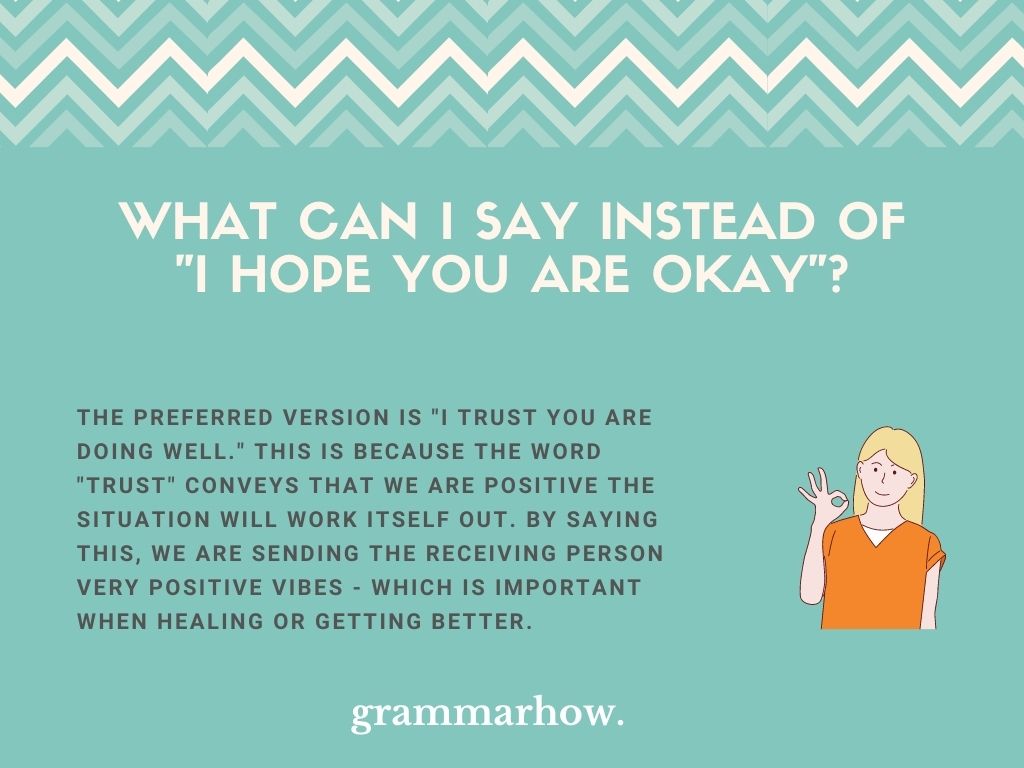We all want to feel supported and cared for, especially during challenging times. Sometimes, a simple phrase can convey volumes of empathy and concern. One such phrase is “I hope you’re okay.” This seemingly straightforward statement carries a weight of meaning that goes beyond just checking in on someone. It expresses genuine care and well-wishing, offering comfort and reassurance to those who might be struggling.
This article delves into the multifaceted meaning of “I hope you’re okay,” exploring its various uses and the impact it can have on others. We’ll examine how this phrase functions as a tool for expressing concern, demonstrating empathy, and providing support during moments of need.
Meaning of “I Hope You’re Okay”
At its core, “I hope you’re okay” is a statement of well-wishing. It conveys a sincere desire for someone’s well-being, both physically and emotionally. When we say these words, we are acknowledging that the person might be going through a difficult time and expressing our hope that they will navigate it successfully.
The phrase can also carry a sense of urgency, particularly when used in response to a potentially stressful situation. For example, if someone shares news of a personal setback or expresses feelings of distress, “I hope you’re okay” immediately signals your concern and willingness to offer support.
Uses of “I Hope You’re Okay”

The versatility of “I hope you’re okay” allows it to be used in a wide range of situations. It can be employed casually among friends and family or more formally in professional settings.
Expressing Concern After an Event
When someone experiences a challenging event, such as a personal loss, illness, or accident, “I hope you’re okay” serves as a heartfelt expression of concern. It acknowledges the gravity of the situation and conveys your willingness to offer support during this difficult time.
Checking In on Someone Who Seems Distressed
Sometimes, people might exhibit signs of distress without explicitly stating their feelings. If you notice a friend or colleague appearing downcast or withdrawn, “I hope you’re okay” can be a gentle way to open the conversation and offer your support.
Expressing Concern and Well-Wishing
The primary function of “I hope you’re okay” is to express concern for someone’s well-being. It conveys a genuine desire for them to be happy, healthy, and safe. This simple phrase can provide comfort and reassurance, letting the recipient know that they are not alone and that someone cares about their well-being.
Empathy and Care

Beyond expressing concern, “I hope you’re okay” also demonstrates empathy. It acknowledges the other person’s feelings and shows that you understand they might be going through a difficult time. By saying these words, you validate their emotions and create a space where they feel heard and understood.
Offering Support and Reassurance
When someone is struggling, “I hope you’re okay” can offer a sense of support and reassurance. It lets them know that you are there for them and willing to listen without judgment. While it might not always be possible to solve their problems, simply expressing your concern and offering your presence can make a significant difference.
Conclusion
“I hope you’re okay” is more than just a casual phrase; it’s a powerful statement of care and concern. Its simplicity belies its profound impact, conveying empathy, offering support, and reminding individuals that they are not alone. By incorporating this phrase into our conversations, we can create a more compassionate and supportive environment for ourselves and those around us.



